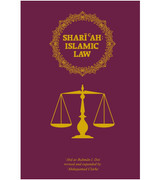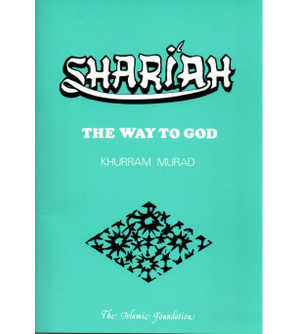
Shari'ah The Way of Justice
The author takes up some specific issues which agitate the modern mind as it contemplates the prospects of full implementation of the Shari'ah: especially those concerning the position of women and criminal punishment. As a result of an adroitly manipulated exposure to the imagery of a whip cracking on a naked back and a veil enshrouding a woman's face, what to a Muslim is the object of his longing and endeavor has been very subtly projected as a relic from the dark ages, as something barbaric and cruel. A brief treatment, as this booklet does, cannot erase an image so assiduously cultivated nor can it do full justice to the issues which are engaging so many minds.
But it does make a successful attempt to place them in their true and proper perspective. No apologies or excuses, nor any devious intellectual arguments are employed to explain away what the Shari'ah has so clearly laid down. For the Shari'ah is itself the absolute criterion of justice, mercy, and civilization. Starting from this premise, the author goes on to demonstrate the vital importance that Islam attaches to the crucial factors of Individual, Family and Society and the exquisite balance that it establishes between them. All other pieces -- sex roles, polygamy, divorce, punishments for violations of life, property, honor, sanctity of family, etc. -- these fall in their places. All these aspects have, however, been dealt with succinctly, convincingly and lucidly. This booklet can be of great help in explaining some important questions that arise during the da'wah work.
$5.99
- SKU:
- ENB-ISLW-002934
- Gift wrapping:
- Options available
- Author:
- Khurram Murad
- Publisher:
- Kube Publishing Ltd
- Format:
- Paperback
- Language:
- English
- Age Range:
- Adults
The author takes up some specific issues which agitate the modern mind as it contemplates the prospects of full implementation of the Shari'ah: especially those concerning the position of women and criminal punishment. As a result of an adroitly manipulated exposure to the imagery of a whip cracking on a naked back and a veil enshrouding a woman's face, what to a Muslim is the object of his longing and endeavor has been very subtly projected as a relic from the dark ages, as something barbaric and cruel. A brief treatment, as this booklet does, cannot erase an image so assiduously cultivated nor can it do full justice to the issues which are engaging so many minds.
But it does make a successful attempt to place them in their true and proper perspective. No apologies or excuses, nor any devious intellectual arguments are employed to explain away what the Shari'ah has so clearly laid down. For the Shari'ah is itself the absolute criterion of justice, mercy, and civilization. Starting from this premise, the author goes on to demonstrate the vital importance that Islam attaches to the crucial factors of Individual, Family and Society and the exquisite balance that it establishes between them. All other pieces -- sex roles, polygamy, divorce, punishments for violations of life, property, honor, sanctity of family, etc. -- these fall in their places. All these aspects have, however, been dealt with succinctly, convincingly and lucidly. This booklet can be of great help in explaining some important questions that arise during the da'wah work.











